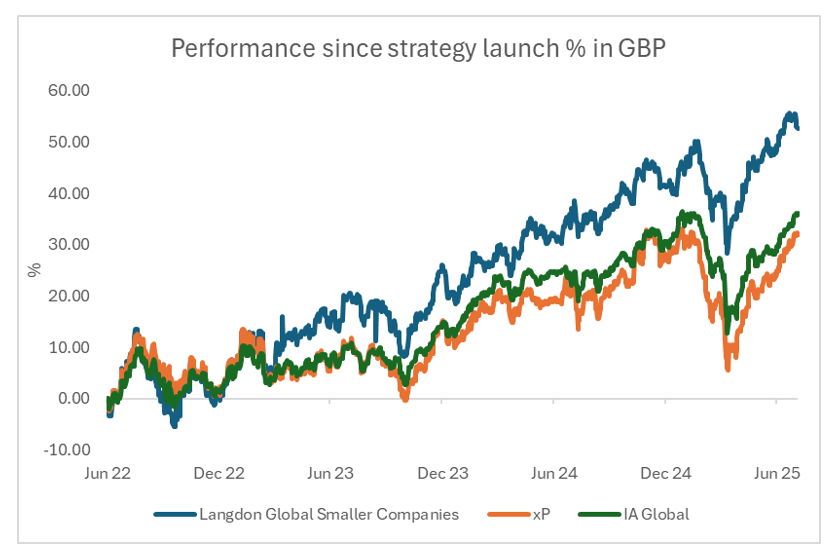In the first of a new series taking a closer look at boutique investment houses and the strategies they run, Alex Paget explains what draws the Downing Fox multi-asset fund range he runs with Simon Evan-Cook to this particular type of corporate structure and the reasons why they decided to invest in the Langdon Global Smaller Companies Fund
Our work sees us constantly on the hunt for what we call ‘bellitious’ fund managers – and if you have not come across the word before, that is because we made it up. Our reason for doing so? There is not a current word or phrase out there that adequately defines the types of investors we want to own in our portfolio.
“We are looking for managers who are absolutely obsessed with the way they invest.
Bellitious (adj.)
[bell-ish-uhs]
Driven to fight or endure great discomfort to follow one’s conscience; willing to break laws, rules or social norms in order to uphold one’s inner sense of what is right.
From belligerent/bellicose: being inclined to fight; and conscientious: being governed by conscience
Essentially, we are looking for managers who are absolutely obsessed with the way they invest, disciplined, intensely ‘bottom-up’ in their approach and with the courage to be different to the herd when they have the conviction to do so.
This is why we tend to focus on boutiques as it is the type of corporate structure that is best suited to fostering independently-minded stockpickers. You need collective ‘skin in the game’ and, importantly, patience to stick it out when a strategy inevitably underperforms. It is for these reasons we were drawn to the Langdon Global Smaller Companies Fund, which we invested in earlier this summer.
Langdon is a Toronto-based boutique founded by Greg Dean, who is also the lead portfolio manager. He had worked at larger firms running a similar strategy but wanted to create a business that avoided the pitfalls he felt plagued large, bureaucratic firms, where resources were often uncoordinated and decision-making was centralised, leading to inefficiencies and missed opportunities.
Dean was also keen to build a team-oriented culture, where ownership and incentives were shared, and where the focus was on people, talent, and long-term value creation, rather than short-term benchmarks or rigid structures.
Dean and his colleagues adopt a ‘business owner mindset’, focusing on exceptional management teams who they can partner with.”
The fund itself is a quality-oriented strategy, with Greg supported by four other investment professionals. Each of the analysts is a regional and sector lead, and also a secondary analyst on a different region and sector. They invest in under-researched global smallcaps that they believe can double over five years without re-rating.
Dean and his colleagues adopt a ‘business owner mindset’, focusing on exceptional management teams who they can partner with. They also look for companies with sustainable and improving return on invested capital metrics, strong and growing cashflows and optionality – that is, those that can tread their own path thanks to healthy balance sheets, proven M&A strategies and a good history of capital allocation.
Despite this focus on quality, they do have a disciplined approach to valuation, reducing positions – or, indeed, selling them completely – if the share price no longer offers the right risk/reward skew.
‘Expected performance’
The portfolio is made up of around 35 stocks and positions are sized on their upside (measured over three years) versus potential downside (measured over one year), as well as business model quality, execution history as a public company, accounting quality, quality of management, sector and region diversification and liquidity considerations.
While the UCITS fund is a relatively new offering, the team have been managing this strategy since 2022 via an Aussie vehicle that, as you can see from the following chart, has delivered phenomenal performance compared with both its ‘xP’ – which stands for ‘expected performance’, where we create a customised benchmark that matches a fund’s historic style and market cap exposures – and the mega-cap biased global sector.

In our view, the strengths of the strategy stem from the boutique nature and specialism of the business, plus – given the team’s focus on less covered smaller companies – it is an area where bottom-up active managers should be able to add real value.
We like Dean’s competitive nature and the fact he has wanted to learn from his experiences – particularly the willingness to improve the business’s ‘execution’ and the more tactical elements of investing, as well as ways they can overcome certain emotional biases that are natural in fund management.
All told, we have high hopes for the strategy and believe Dean and his team have the ingredients needed to deliver market-beating returns over the long term.
Alex Paget is a fund manager at Downing Fund Managers










